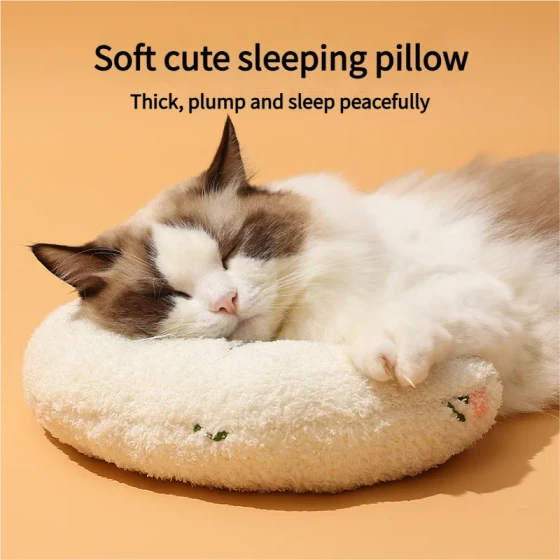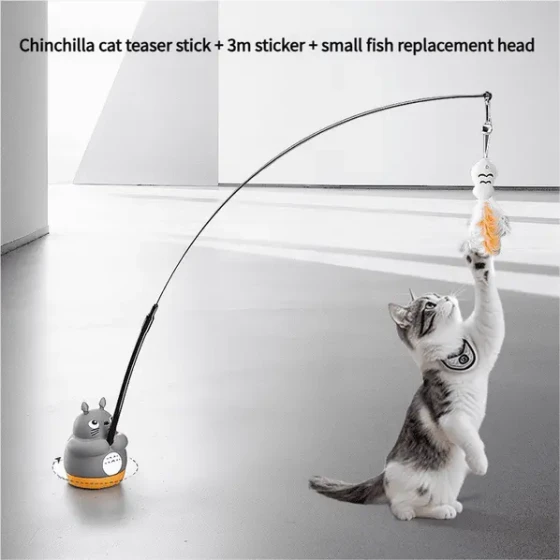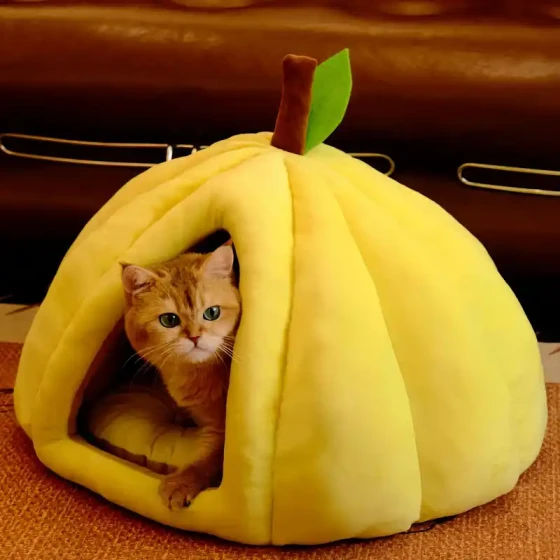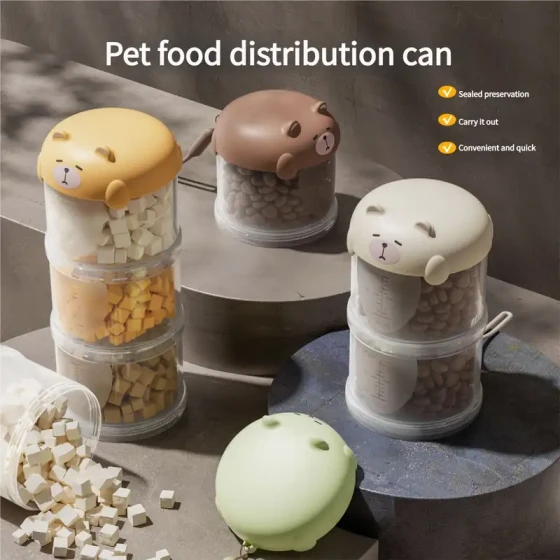How many times does a kitten poop in one day_Analysis of the relationship between kitten defecation frequency and health
Caring about a kitten's health, observing their defecation situation is an important part. Generally, healthy kittens, especially those just born within a few weeks, have more frequent bowel movements due to their immature digestive system and habits of nursing or frequent feeding. As they grow older and their diet structure changes, their defecation frequency gradually stabilizes. If abnormalities are found in the frequency, texture, or color of a kitten's stool, this may be a health signal from the body that needs attention.
Kitten defecation frequency at different stages
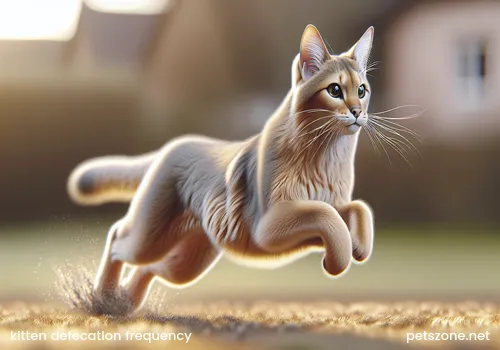
The frequency of kitten defecation changes as they grow, just like human babies having different "rhythms" at different stages. Understanding these can help you better judge whether your little one's "poop" is normal.
- Newborn to 1 week old: At this stage, kittens are very fragile and cannot defecate on their own. They require the mother cat (or caregiver) to stimulate defecation by licking the abdomen and anal area. Usually, they defecate after every feeding, possibly multiple times a day depending on feeding frequency, up to a dozen times or more.
- 2 to 3 weeks old: The kitten's digestive system starts to gradually develop and may still require stimulation to defecate but begins to form more regular defecation habits. They may defecate about 2 to 3 times a day.
- 4 to 6 weeks old: Many kittens start to transition to solid food and their digestive system matures further. Most can defecate independently without relying entirely on external stimulation. Defecation frequency may stabilize at 1 to 3 times a day.
- 7 to 12 weeks old: Most kittens have fully weaned and mainly eat solid food. Their defecation becomes more regular, usually at least once a day. If they eat several small meals a day, the frequency may be somewhat higher.
- 3 months old and above: With further development, kitten defecation habits become closer to adult cats, generally 1 to 2 times a day is common.
It should be noted that even healthy kittens vary individually; some may poop more frequently while others less so. Kittens newly arriving in a home may not defecate for two or even three days due to environmental changes and stress, but as long as their spirit and appetite are normal, they usually return to a regular pattern after adapting.
Factors affecting kitten defecation frequency
Kitten defecation frequency is not fixed and is influenced by multiple factors:
- Age: This is the primary factor. As mentioned, the younger the kitten, the higher the frequency usually is.
- Diet: Food is the most direct factor affecting defecation.
- Food type: Kittens fed wet food generally have more frequent bowel movements than those eating only dry food, as wet food has higher moisture which aids digestion. Sudden changes in diet can also alter defecation habits, causing diarrhea or constipation. Gradual transition when switching food is recommended.
- Feeding amount and frequency: Kittens fed frequently in large amounts naturally defecate more often. Overfeeding may cause indigestion, soft stools, or increased frequency.
- Food ingredients: Ingredients the kitten cannot tolerate or is allergic to (such as milk), as well as hard-to-digest foods, may cause diarrhea. Lack of dietary fiber can result in constipation.
- Health condition: Intestinal parasites, bacterial or viral infections, gastroenteritis, and other diseases significantly impact kitten defecation, possibly causing diarrhea or constipation.
- Water intake: Insufficient hydration easily leads to dry, hard stools causing constipation.
- Activity level: Moderate activity promotes intestinal peristalsis and helps defecation. Less active kittens may have lower defecation frequency.
- Stress: Moving, environmental changes, or new household members may cause stress affecting the digestive system, resulting in abnormal defecation such as diarrhea or constipation.
- Congenital factors: In rare cases, kittens may have congenital digestive tract abnormalities affecting normal defecation.
How to determine if a kitten’s "poop" is healthy?
Looking at defecation frequency alone is not enough; the physical characteristics, color, and smell of the stool are also important health indicators. The "Bristol Stool Chart" can be referenced for assistance in judgment.
- Shape and consistency: Healthy kitten feces are usually brown or dark brown, shaped like small sausages or strips, with a smooth or slightly cracked surface, toothpaste-like texture, soft yet formed, not too hard or mushy.
- Too hard and granular: May indicate constipation, suggesting insufficient water or fiber intake.
- Soft, unformed stools: May indicate indigestion, dietary problems, or mild gastrointestinal discomfort.
- Paste-like or watery: This is diarrhea and requires prompt investigation.
- Color: Except for the first two days after birth when black, tar-like meconium is normal, healthy kitten feces should be brown or dark brown.
- Yellow: May relate to rapid food transit through the gut or indicate liver or gallbladder issues. If foul-smelling, may relate to parasites like coccidia.
- Green: Food passing too quickly or bacterial infection.
- Black or dark green: If not meconium, likely upper digestive tract bleeding requiring immediate veterinary attention.
- Red or blood-tinged: Fresh red blood in stool suggests lower digestive tract bleeding or inflammation (colon, rectum), possibly caused by infection, parasites, etc., requiring urgent veterinary care.
- White or pale: May be related to liver, pancreas, or bile secretion abnormalities. In extreme cases, white, shapeless stool may signal severe bacterial imbalance and is very dangerous.
- White spots: May indicate intestinal parasites such as tapeworm segments.
- Odor: Cat feces always has some smell, but if the scent suddenly becomes abnormally foul or pungent, it may be related to indigestion, infection, or parasites.
- Other: Observe if mucus is mixed in the stool (possibly indicating intestinal irritation or infection), or undigested food residues.
Relation between abnormal kitten defecation and health issues
Abnormal defecation is often a "barometer" of kitten health problems.
- Diarrhea: Kitten diarrhea is very dangerous because the small body size easily leads to dehydration, which can be life-threatening. Common causes include diet changes, unclean food, parasites (like coccidia, giardia), bacterial infection, viral infections (such as feline distemper), stress, food allergies or intolerances.
- Constipation: If a kitten has difficulty defecating, dry hard stools, or has not pooped for over 24-48 hours, constipation may be present. Chronic constipation can lead to severe conditions like megacolon. Common causes include dehydration, lack of fiber in diet, ingestion of foreign bodies, hairballs, intestinal parasites, neurological or underlying diseases.
- Painful or difficult defecation: If a kitten sits in the litter box for a long time straining or crying but passes little or no stool, this may indicate constipation or other urinary tract problems.
How to help kittens maintain a healthy digestive system?
Good daily care is key to maintaining a kitten's digestive health:
- Provide high-quality, easily digestible food: Choose cat food specially formulated for kittens, preferably rich in high-quality animal protein and low in carbohydrates.
- Gradually change food: If switching cat food, transition gradually over about a week to avoid gastrointestinal upset caused by sudden changes.
- Ensure adequate water intake: Always provide clean, fresh water. If feeding mostly dry food, consider adding wet food or a small amount of water to increase hydration. Cats may prefer running water; a pet water fountain can be used.
- Feed small meals frequently: Especially for young kittens, feeding several small meals a day aids digestion and absorption.
- Keep environment clean: Regularly clean the litter box and keep food and water bowls clean to reduce bacterial growth.
- Moderate exercise: Encourage play to increase activity, which helps promote intestinal motility.
- Regular deworming and checkups: Follow vet recommendations for regular deworming to prevent parasite-related digestive issues. Schedule regular health checks to detect and treat potential problems early.
- Avoid inappropriate foods: Do not feed kittens human food, milk (most cats are lactose intolerant), or other items that may cause digestive upset or toxicity.
- Cautiously use probiotics and dietary fiber: Under veterinary guidance, consider supplements of probiotics or moderate amounts of dietary fiber (such as cooked pumpkin puree) to support intestinal health and improve constipation or soft stools.
Common questions and answers
Q1: My kitten poops loose stool many times a day but is energetic. Should I see a doctor?
A: Even if the kitten is energetic, loose stools (diarrhea) warrant a prompt veterinary consultation. Kittens have fragile digestive systems; diarrhea can cause rapid dehydration, and potential underlying issues such as parasites or infections may be present.
Q2: My kitten hasn’t pooped all day. Is it constipated?
A: Healthy kittens vary in defecation frequency; some may poop 1-3 times daily, others less often. If your kitten hasn't pooped for over 24 hours or 48 hours accompanied by lethargy, reduced appetite, bloating, crying or straining during defecation, constipation is likely and veterinary care is necessary. Occasional delays over one day with normal other signs can be observed while ensuring adequate hydration.
Q3: Why does my kitten’s stool color change? What do different colors mean?
A: Stool color is an important indicator of digestive and health status. Normal stool is brown or dark brown. Yellow, green, black, or bloody stools may indicate various health issues—please refer to the color explanations above. Abnormal coloration should raise caution and may require veterinary attention.
Q4: How do I help a kitten who needs stimulation to poop?
A: For kittens younger than four weeks who cannot defecate independently, gently massage the abdomen and anal area with a warm, damp cotton ball or soft tissue after each feeding, mimicking the mother cat’s licking. Be gentle and avoid excessive force. Clean well after defecation.
Summary
Observing kitten defecation is a must-learn for every "pet parent." Understanding normal defecation frequency at different ages, recognizing healthy stool characteristics and colors, and being alert for abnormal signals can help us detect potential kitten health problems early. If there are any doubts about your kitten’s stool, or if persistent diarrhea, constipation, blood, or other abnormalities occur, never self-diagnose or medicate. Consult a professional veterinarian promptly to obtain accurate diagnosis and treatment advice to safeguard your kitten’s healthy growth.
References:
- Understanding Kitten Poop: What's Normal and What's Not - Barely There Litter
- Constipation — Kitten Lady
- What to do if your cat has diarrhea? 5 main causes and when to see a vet - Royal Canin
- Should you see a doctor for cat diarrhea? 5 causes and improvement methods - Taipei Pet Supplies Expo
- Kitten Constipation - PetMD
- Kitten Diarrhea (Should You Be Worried?) - BluePearl Pet Hospital
- Kittens under four weeks cannot defecate independently and need help this way - Sina
- Cat care knowledge: How many times should cats poop in one day? - NetEase
- How often should cats poo and pee? | Blog - Cats Protection
- How Often Do Cats and Kittens Poop? | ARM & HAMMER™
- What to do if your kitten has diarrhea? Understanding 6 common factors and solutions - Pet Era
- Kitten Diarrhea | PetMD
- 18 Common Causes of Diarrhea in Cats and Kittens - CareCredit
- Diarrhea - Kitten Lady
- Experience raising cats: Can kittens get constipated? - Diary - Douban
- Kitten Diarrhoea: Common Causes & Treatments - Purina
- When Do Kittens Poop On Their Own? (Plus, How To Stimulate Kitten Poops) - Rover.com
- Essential tips for dealing with diarrhea in your kitten - Ontario SPCA and Humane Society
- What to do if your kitten has diarrhea? | Professional vet—Yang Xiaobo - PetTalk
- What to do if your kitten has diarrhea? Understanding 3 common factors and preventative methods - Monster Tribe
- How Often Should A Kitten Poop – and What Does It Mean? - dr. emmanuel fontaine
- Understanding the Causes and Treatment for Constipation in Kittens
- Let's Talk About Kitten Constipation: Signs, Remedies and Prevention - Pet Food from Iams
- Have a Constipated Kitten? Here's How to Help Your Kitty Poop - Chewy.com
- Kitten Stool Chart
- What to do if a kitten is constipated and best foods for kitten constipation - China Pet Culture Festival
- "Kitten Care - Battle Rules.4" Excretion: Kitten diarrhea? Soft stools? How to adjust diet - Moreson
- How often do cats defecate normally - Sina
- How many times a day does a cat normally go to the bathroom?
- [Cat Health Check] Cat health can be judged from stool! Shape, smell, and color differences - Reed Cat Litter
- Causes, symptoms, and treatment of kitten constipation - NetEase
- The Big Scoop: How to Know if a Cat Has Healthy Poop (And Toilet Routine)
- [Cat Health Check] Cat health can be judged from stool! Shape, smell, and color differences - Kaishu Cat Litter
- How to determine and manage cat constipation? Three prevention methods!
- How many times does a cat normally eliminate daily - NetEase
- A Guide to Healthy Cat Poop | Healthy Paws Pet Insurance
- Cat stool atlas! Is soft stool or diarrhea with strong odor normal? Cat poop health guide - Wang Miao Planet
- Kitten pooping too much: r/CatAdvice - Reddit
- Feline Friendly Digestion: Top Tips for Sensitive Stomachs in Cats | Vets Love Pets
- 9 Ways to Improve Your Cat's Digestive Health - AnimalBiome
- 5 Tips to Improve Your Cat's Gut Health - Purina Arabia
- How To Improve Your Cat's Digestion? - fur/ball
- Vet Approved Cat Stool Chart: Decoding Your Cat's Poop - Cats.com
